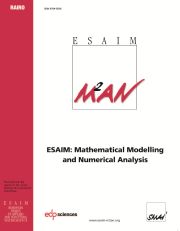Article contents
Regularity and approximability of the solutions to the chemical master equation∗
Published online by Cambridge University Press: 03 October 2014
Abstract
The chemical master equation is a fundamental equation in chemical kinetics. It underlies the classical reaction-rate equations and takes stochastic effects into account. In this paper we give a simple argument showing that the solutions of a large class of chemical master equations are bounded in weighted ℓ1-spaces and possess high-order moments. This class includes all equations in which no reactions between two or more already present molecules and further external reactants occur that add mass to the system. As an illustration for the implications of this kind of regularity, we analyze the effect of truncating the state space. This leads to an error analysis for the finite state projections of the chemical master equation, an approximation that forms the basis of many numerical methods.
Keywords
- Type
- Research Article
- Information
- ESAIM: Mathematical Modelling and Numerical Analysis , Volume 48 , Issue 6 , November 2014 , pp. 1757 - 1775
- Copyright
- © EDP Sciences, SMAI 2014
References
- 8
- Cited by




